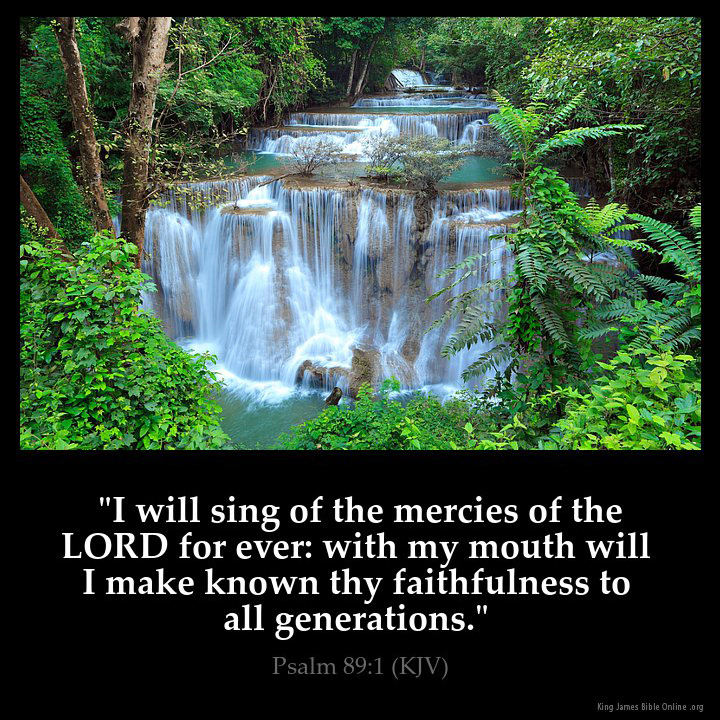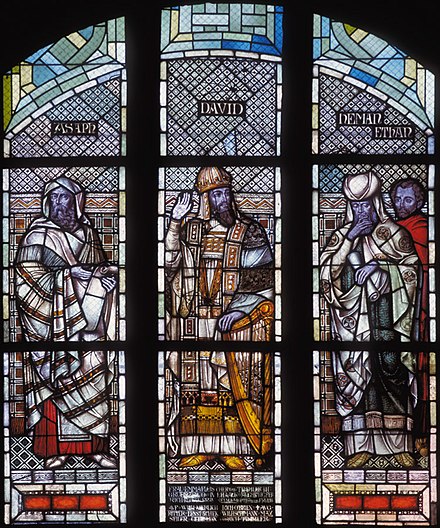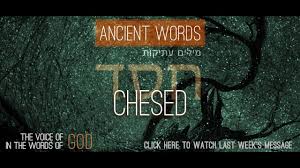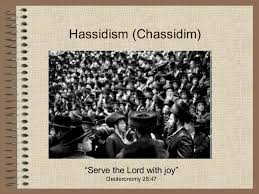

I will sing of the steadfast love [chesed] of the Lord, forever;
with my mouth I will make known your faithfulness to all generations.
2 For I said, “Steadfast love will be built up forever;
in the heavens you will establish your faithfulness.”
3 You have said, “I have made a covenant with my chosen one;
I have sworn to David my servant:
4 ‘I will establish your offspring forever,
and build your throne for all generations.’” Selah
5 Let the heavens praise your)wonders, O Lord,
your faithfulness in the assembly of the holy ones!
6 For who in the skies can be compared to the Lord?
Who among the heavenly beings is like the Lord,
7 a God greatly to be feared in the council of the holy ones,
and awesome above all who are around him?
8 O Lord God of hosts,
who is mighty as you are, O Lord,
with your faithfulness all around you?
9 You rule the raging of the sea;
when its waves rise, you still them.
10 You crushed Rahab like a carcass;
you scattered your enemies with your mighty arm.
11 The heavens are yours; the earth also is yours;
the world and all that is in it, you have founded them.
12 The north and the south, you have created them;
Tabor and Hermon joyously praise your name.
13 You have a mighty arm;
strong is your hand, high your right hand.
14 Righteousness and justice are the foundation of your throne;
steadfast love and faithfulness go before you.
15 Blessed are the people who know the festal shout,
who walk, O Lord, in the light of your face,
16 who exult in your name all the day
and in your righteousness are exalted.
17 For you are the glory of their strength;
by your favor our horn is exalted.
18 For our shield belongs to the Lord,
our king to the Holy One of Israel.
19 Of old you spoke in a vision to your godly one, and said:
“I have granted help to one who is mighty;
I have exalted one chosen from the people.
20 I have found David, my servant;
with my holy oil I have anointed him,
21 so that my hand shall be established with him;
my arm also shall strengthen him.
22 The enemy shall not outwit him;
the wicked shall not humble him.
23 I will crush his foes before him
and strike down those who hate him.
24 My faithfulness and my steadfast love shall be with him,
and in my name shall his horn be exalted.
25 I will set his hand on the sea
and his right hand on the rivers.
26 He shall cry to me, ‘You are my Father,
my God, and the Rock of my salvation.’
27 And I will make him the firstborn,
the highest of the kings of the earth.
28 My steadfast love I will keep for him forever,
and my covenant will stand firm in [for] him.
29 I will establish his offspring forever
and his throne as the days of the heavens.
30 If his children forsake my law
and do not walk according to my rules,
31 if they violate my statutes
and do not keep my commandments,
32 then I will punish their transgression with the rod
and their iniquity with stripes,
33 but I will not remove from him my steadfast love
or be false to my faithfulness.
34 I will not violate my covenant
or alter the word that went forth from my lips.
35 Once for all I have sworn by my holiness;
I will not lie to David.
36 His offspring shall endure forever,
his throne as long as the sun before me.
37 Like the moon it shall be established forever,
a faithful witness in the skies.” Selah
38 But now you have cast off and rejected;
you are full of wrath against your anointed.
39 You have renounced the covenant with your servant;
you have defiled his crown in the dust.
40 You have reached all his walls;
you have laid his strongholds in ruins.
41 All who pass by plunder him;
he has become
the scorn of his neighbors.
42 You have exalted the right hand of his foes;
you have made all his enemies rejoice.
43 You have also turned back the edge of his sword,
and you have not made him stand in battle.
44 You have made his splendor to cease
and cast his throne to the ground.
45 You have cut short the days of his youth;
you have covered him with shame. Selah
46 How long, O Lord? Will you hide yourself forever?
How long will your wrath burn like fire?
47 Remember how short my time is!
For what vanity you have created all the children of man!
48 What man can live and never see death?
Who can deliver his soul from the power of Sheol? Selah
49 Lord, where is your steadfast love of old,
which by your faithfulness you swore to David?
50 Remember, O Lord, how your servants are mocked,
and how I bear in my of all the many nations,
51 with which your enemies mock, O Lord,
with which they mock the footsteps of your anointed.
52 Blessed be the Lord forever!
Amen and Amen.

1. God’s character and covenant with David 89:1-4
Ethan announced two major themes of this psalm in Psalms 89:1-2. These are the loyal love (Heb. hesed) and faithfulness of Yahweh. References to God’s loyal love occur in Psalms 89:1-2; Psalms 89:14; Psalms 89:24; Psalms 89:28; Psalms 89:33; Psalms 89:49. He referred to God’s faithfulness in Psalms 89:1-2; Psalms 89:5; Psalms 89:8; Psalms 89:24; Psalms 89:33; Psalms 89:49. He proceeded to appeal to God to honor His promises to David on the basis of these qualities.
The psalmist restated the Davidic Covenant promises in Psalms 89:3-4. Interestingly the word "covenant" does not occur in either 2 Samuel 7 or 1 Chronicles 17, the two places in the Old Testament where God recorded the giving of that covenant. Three key terms used in these two verses also recur throughout this psalm. These are "covenant" (Psalms 89:3; Psalms 89:28; Psalms 89:34; Psalms 89:39), "David My servant" (Psalms 89:3; Psalms 89:20; Psalms 89:50 where it is just "My servant"), and "throne" (Psalms 89:4; Psalms 89:14; Psalms 89:29; Psalms 89:36; Psalms 89:44). Obviously the Davidic Covenant was central in the writer’s thinking in this psalm.
"The background for the Davidic Covenant and the sonship imagery associated with it is the ancient Near Eastern covenant of grant, whereby a king would reward a faithful servant by elevating him to the position of ’sonship’ and granting him special gifts, usually related to land and dynasty. Unlike the conditional suzerain-vassal treaty, after which the Mosaic Covenant was patterned, the covenant of grant was an unconditional, promissory grant which could not be taken away from the recipient. [Note: Footnote 18: "See [Moshe] Weinfeld, ’The Covenant of Grant in the Old Testament and in the Ancient Near East,’ [Journal of the American Oriental Society 90 (1970):] pp. 184-203, for a thorough study of this type of covenant and its biblical parallels, including the Davidic Covenant. . . ."] Consequently God’s covenantal promises to David were guaranteed by an irrevocable divine oath (Psalms 89:3; Psalms 89:28-37; Psalms 132:11)." [Note: Chisholm, "A Theology . . .," p. 267.]
The writer of this royal psalm was Ethan, another wise Levitical musician in David’s service (1 Kings 4:31; 1 Chronicles 15:17-18). The occasion of writing is unclear. Judging from the content of the psalm it appears to have been a time after David had suffered defeat and some severe affliction.
Ethan interceded for the king, claiming the Davidic Covenant promises (cf. 2 Samuel 7:5-16; 1 Chronicles 17). Why was God afflicting David so severely since He had promised to bless him so greatly? Ethan called on God to honor the Davidic Covenant and send the king relief.
Verses 5-14These verses exalt the uniqueness of Yahweh. Ethan praised Him for His attributes (Psalms 89:5-8) and works (Psalms 89:9-14). Outstanding among His attributes are His faithfulness and His might. The "holy ones" (Psalms 89:7) are the angels. The works he cited were subduing the flood, defeating Egypt (Rahab, cf. Psalms 87:4) at the Exodus, and creating the heavens and earth. He personified Mt. Tabor and Mt. Hermon rejoicing in God’s great power.
"Tabor and Hermon are possibly paired as works of God which praise Him in different ways: the lowly Tabor (1,900 ft.) by its history, as the scene of Deborah’s victory, and the giant Hermon (9,000 ft.) by its physical majesty. The Creator’s hand is both strong and high (13)." [Note: Kidner, Psalms 73-150, p. 321.]
2. The character of God 89:5-18
Ethan went on to speak of the blessings the Israelites who acknowledged and walked with God experienced. They had joy, exaltation, glory, strength, and security. "The joyful sound" (Psalms 89:15, NASB) refers to the shout of joy God’s people uttered when they saw Him lifted up and honored (cf. 1 Samuel 4:5-6). [Note: Ibid., p. 322.] A better translation might be, "Happy the people who have learnt to acclaim thee" (NEB). "Our horn" (Psalms 89:17) means "our strength." Ethan rejoiced that Israel’s king, who was her defense, belonged to God (Psalms 89:18).
"In many Jewish synagogues today, Psalms 89:15-18 are recited on their New Year’s Day after the blowing of the shofar." [Note: Wiersbe, The . . . Wisdom . . ., p. 252.]
The psalmist now reminded God that He had chosen David to be His anointed servant king. God’s "godly ones" (Psalms 89:19) were the godly in Israel.
3. The promises of God 89:19-37
God had promised to bless David with success and power. He had foretold that David would defeat his enemies and extend his influence greatly. Furthermore, He had pledged to be faithful and loyal to David.
God promised that David would enjoy a special relationship of intimacy with Yahweh, who would treat him as His firstborn son (2 Samuel 7:14). This involved double blessings and much authority under his Father. David would become the most highly exalted king on the earth. Moreover, God would bless him with a dynasty that would rule Israel forever (cf. 2 Samuel 7:12-13; 2 Samuel 7:16).
Sin and disobedience would not cancel God’s promises to David in the covenant. They would bring discipline on the offenders, but God swore to deliver the blessings He had promised David.
Since Jesus Christ, David’s descendant, has not yet ruled over Israel as these promises guarantee, we should look for a literal fulfillment of them in the future. This means He will rule on the earth, since this is what God promised David (2 Samuel 7:5-16). For this reason we look for an earthly reign of Messiah, not just a heavenly reign over the hearts of all believers. [Note: See the discussion of the messianic king in VanGemeren, pp. 586-91.] The hope of an earthly reign over Israel is what distinguishes premillennialists from amillennialists and postmillennialists. This hope rests on a literal interpretation of God’s promises in the Davidic Covenant (cf. Psalms 89:3-4; Psalms 89:27-29; Psalms 89:35-37; Psalms 89:49). [Note: See Ronald B. Allen, "Evidence from Psalms 89," in A Case for Premillennialism: A New Consensus, pp. 55-77.]
Next, Ethan recounted what God had permitted to overtake David. He was now weak and defeated, rather than strong and successful. God had seemingly cut David off and gone back on His promises. The fall of Jerusalem is probably in view, and the Davidic king would have been Jehoiachin.
4. The appeal to God 89:38-52
Ethan called on God to remember David and His promises before the king or his line died. In conclusion, he reaffirmed his belief in God’s loyal love and faithfulness (Psalms 89:49). However, he asked God to remember His servants and His anointed before long (Psalms 89:50-51). All the psalmist could do was wait for God to answer.
When God seems to be acting contrary to His character and promises, the godly should remember that He is loyal and faithful. They should call on Him to act for His own glory and for the welfare of His people. However, they must remember that appearances can often be deceiving, as they were in this case. God was disciplining David; He had not cut him off.
Psalms 89:52 concludes Book 3 of the Psalter (Psalms 73-89).

Ethan (Hebrew: אֵיתָן, Modern: ʾĒtan, Tiberian: ʾĒṯān, "Firm") the Ezrahite, is mentioned in the Hebrew Bible. Ethan was a boy at King David's court well known for his wisdom. He authored Psalms 89: this Psalm is entitled "a maschil or contemplation of Ethan the Ezrahite". Baptist preacher Charles Spurgeon theorised that this was the same person as Jeduthun.[citation needed] Theologian John Gillrefers to a Jewish tradition which identifies Ethan with Abraham, Heman with Moses, and Chalcol with Joseph.[1][2]
Ethan means strong and optimistic, solid and enduring, permanent. The name Ethan appears eight times in the Hebrew Bible (1 Kings 4:31, Psalm. 89 title, 1 Chronicles. 2:6 and 2:8, 1 Chronicles. 6:42 and 6:44, and 1 Chronicles. 15:17 and 15:19).
He was a standard of wisdom to whom King Solomon is compared favorably. Called there "Ethan the Ezrahite," to whom the title of Psalm 89 ascribes the authorship of that poem.[3]
A "son of Kishi" or "Kishaiah," of the Merarite branch of Levites, and also, with Heman and Asaph, placed by King David over the service of song (1 Chronicles 6:44; 1 Chronicles 15:17, 19).
An ancestor of Asaph of the Gershonite branch of the Levites (1 Chronicles 6:42).
Ethan is the protagonist and narrator of Stefan Heym's 1973 historical novel The King David Report. As depicted by Heym, Ethan is commissioned by the newly enthroned King Solomon to write an official history of his father, King David. Ethan meets and interviews many persons who were associated with David at various periods of the late King's life. However, much of the material gathered by Ethan gets censored out for political reasons by Solomon and his ministers; the royally-approved surviving portions of Ethan's report eventually get into the Bible, forming the later chapters of the Books of Samuel and the early ones of the Books of Kings. Heym clearly used the biblical setting as a metaphor for his own situation as a writer in East Germany's Communist regime.
In its positive sense, the word is used of kindness or love between people, of piety of people towards God as well as of love or mercy of God towards humanity.
It is frequently used in Psalms in the latter sense, where it is traditionally translated "lovingkindness" in English translations.
In Jewish theology it is likewise used of God's love for the Children of Israel, and in Jewish ethics it is used for love or charity between people.
Chesed in this latter sense of "charity" is considered a virtue on its own, and also for its contribution to tikkun olam (repairing the world).
It is also considered the foundation of many religious commandments practiced by traditional Jews, especially interpersonal commandments.
Chesed is also one of the ten Sephirot on the Kabbalistic Tree of Life.
It is given the association of kindness and love, and is the first of the emotive attributes of the sephirot.
(Note from Lambert: There is a dark side to the Kabbalah to be avoided by us novices, similar to the cults and isms of Christianity.)

The root chasad has a primary meaning of "eager and ardent desire," used both in the sense "good, kind" and "shame, contempt."
The noun chesed inherits both senses, on one hand "zeal, love, kindness towards someone" and on the other "zeal, ardour against someone; envy, reproach/"
In its positive it is used of mutual benevolence, mercy or pity between people, of piety of people towards God, as well as grace, favour or mercy of God towards people.
It occurs 248 times in the Hebrew Bible. In the majority of cases (149 times), the King James Bible translation is "mercy," following LXX eleos.
Less frequent translations are: "kindness" (40 times), "lovingkindness" (30 times), "goodness" (12 times),
"kindly" (5 times), "merciful" (4 times), "favour" (3 times) and "good", "goodliness", "pity" (once each).
Only two instances of the noun in its negative sense are in the text, translated "reproach" in Psalm 57:3, and "wicked thing" in Leviticus 20:17.
The translation of loving kindness in KJV is derived from the Coverdale Bible of 1535.
This particular translation is used exclusively of chesed used of the benign attitude of YHWH ("the LORD") or Elohim ("God") towards his chosen,
primarily invoked in Psalms (23 times), but also in the prophets, four times in Jeremiah, twice in Isaiah 63:7 and once in Hosea 2:19.
While "lovingkindness" is now considered somewhat archaic, it is part of the traditional rendition of Psalms in English Bible translations.
Some more recent translations use "steadfast love" where KJV has "lovingkindness." (Wikipedia)

Note Added from Dave Roper:
Lambert, it occurred to me recently that the plural of chesed is, as you know, chassedim, the word used of the pious.
More properly it should mean, "The company of those who love and are loved by God."
David & Carolyn Roper 2503 Bruins CircleBoise, ID 83704208-376-6607
Notes by Lambert Dolphin

Email is welcome
Lambert Dolphin's Place
Recent and Recovered Articles (Free)
Newsletters Old and New
 December 14, 2021, August 17, 2023
December 14, 2021, August 17, 2023